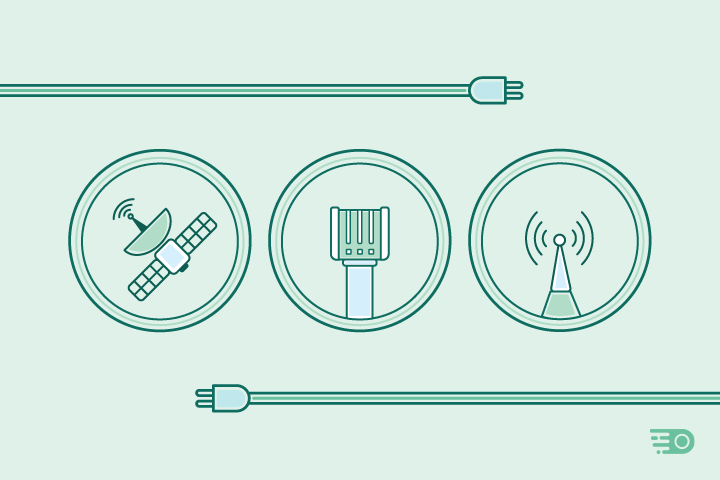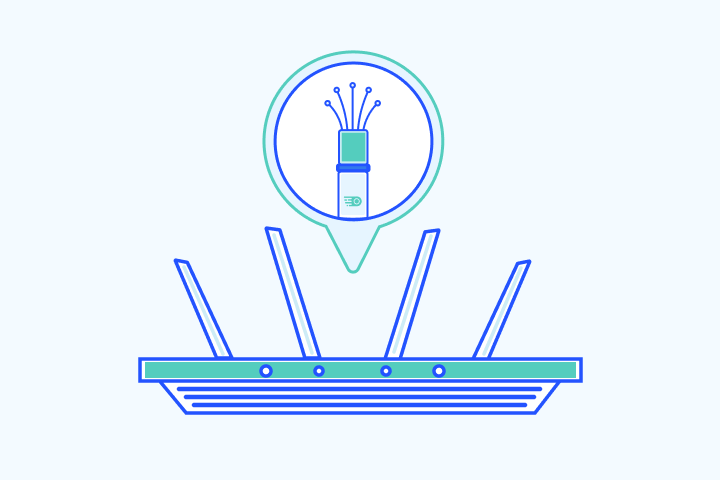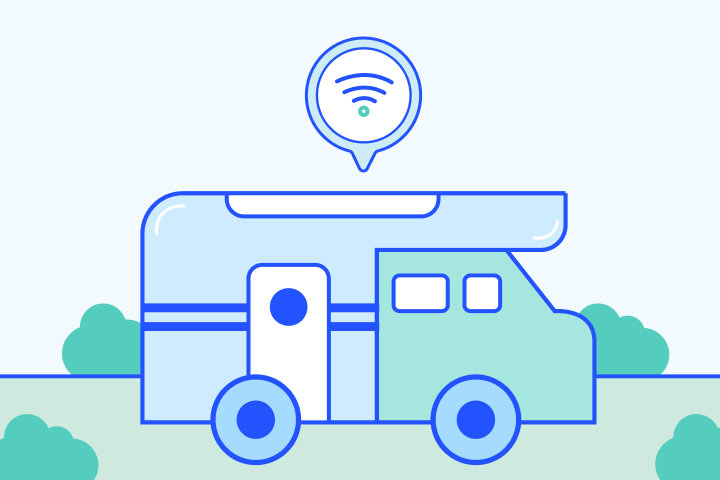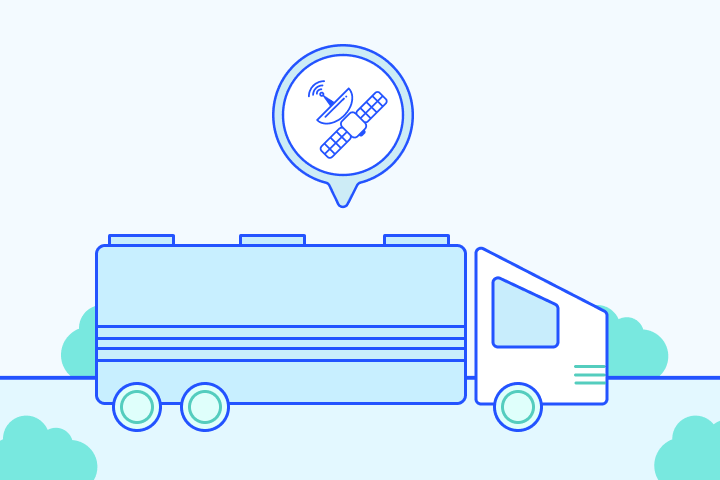Comparing Internet Connection Types

HighSpeedOptions prides itself on providing honest, quality content. While we may be compensated when you make a purchase through links on our site, all opinions are our own. Here's how we make money.
Table of Contents
Internet availability largely depends on your location, with urban areas typically having more internet providers and better access to high-speed options like fiber internet. Rural areas often have fewer choices and may be limited to slower connections like DSL.
Before choosing an internet type, consider your data usage to avoid exceeding caps and paying overage fees. There are six main types of internet: fiber, cable, DSL, satellite, fixed wireless, and 5G, each with different speeds, performance, and costs.
This guide explains the differences between these internet types to help you understand your options and find the best fit for your needs. Use our comparison tool to discover available plans near you.

Internet Connections At a Glance
To give you a general overview, here is a table outlining what each internet connection type typically offers. We compare them based on download speed ranges, starting price ranges, and the percentage of the U.S. population with access.
| Internet Type | Download Speed Range* | Starting Price Range* | % of US Pop. with Access** |
| Fiber | 200 – 2,000 Mbps | $35.00 – $299.95/mo. | 40% |
| Cable | 25 – 1,000 Mbps | $19.99 – $120.00/mo. | 88% |
| DSL | 10 – 150 Mbps | $19.99 – $69.99/mo. | 89% |
| Satellite | 12 – 150 Mbps | $49.99 – $99.00/mo. | 99% |
| Fixed Wireless | 5 – 50 Mbps | $29.99 – $99.00/mo. | 43% |
| 5G | 50 – 10,000 Mbps | $50.00 – $70.00/mo. | N/A |
**Percentages are based on the FCC internet availability data as of 9/13/21.
| Internet Type | Fiber |
| Download Speed Range* | 200 – 2,000 Mbps |
| Starting Price Range* | $35.00 – $299.95/mo. |
| % of US Pop. with Access** | 40% |
| Internet Type | Cable |
| Download Speed Range* | 25 – 1,000 Mbps |
| Starting Price Range* | $19.99 – $120.00/mo. |
| % of US Pop. with Access** | 88% |
| Internet Type | DSL |
| Download Speed Range* | 10 – 150 Mbps |
| Starting Price Range* | $19.99 – $69.99/mo. |
| % of US Pop. with Access** | 89% |
| Internet Type | Satellite |
| Download Speed Range* | 12 – 150 Mbps |
| Starting Price Range* | $49.99 – $99.00/mo. |
| % of US Pop. with Access** | 99% |
| Internet Type | Fixed Wireless |
| Download Speed Range* | 5 – 50 Mbps |
| Starting Price Range* | $29.99 – $99.00/mo. |
| % of US Pop. with Access** | 43% |
| Internet Type | 5G |
| Download Speed Range* | 50 – 10,000 Mbps |
| Starting Price Range* | $50.00 – $70.00/mo. |
| % of US Pop. with Access** | N/A |
Top Internet Providers By Connection Type
| Provider | Connection | Contract Required | |
|---|---|---|---|
| CenturyLink | Fiber, DSL | No | call833-804-2773 |
| EarthLink | Fiber, DSL | Yes | View Plans |
| Viasat | Satellite | Yes | View Plans |
| AT&T | Fiber | Options Available | View Plans |
| Spectrum | Cable, Fiber | No | View Plans |
| Cox | Cable | Yes | call833-395-3409 |
| Frontier | Fiber, DSL | Options Available | call833-704-3560 |
| Optimum | Cable, Fiber | No | call833-804-2812 |
| Sparklight | Cable | No | View Plans |
| Verizon | Fiber, DSL | No | call833-904-5412 |
| Xfinity | Cable | Options Available | call833-704-3550 |
| Provider | CenturyLink |
|---|---|
| Connection | Fiber, Dsl |
| Contract Required | No |
| call833-804-2773 | |
| Provider | EarthLink |
| Connection | Fiber, Dsl |
| Contract Required | Yes |
| View Plans | |
| Provider | Viasat |
| Connection | Satellite |
| Contract Required | Yes |
| View Plans | |
| Provider | AT&T |
| Connection | Fiber |
| Contract Required | Options Available |
| View Plans | |
| Provider | Spectrum |
| Connection | Cable, Fiber |
| Contract Required | No |
| View Plans | |
| Provider | Cox |
| Connection | Cable |
| Contract Required | Yes |
| call833-395-3409 | |
| Provider | Frontier |
| Connection | Fiber, Dsl |
| Contract Required | Options Available |
| call833-704-3560 | |
| Provider | Optimum |
| Connection | Cable, Fiber |
| Contract Required | No |
| call833-804-2812 | |
| Provider | Sparklight |
| Connection | Cable |
| Contract Required | No |
| View Plans | |
| Provider | Verizon |
| Connection | Fiber, Dsl |
| Contract Required | No |
| call833-904-5412 | |
| Provider | Xfinity |
| Connection | Cable |
| Contract Required | Options Available |
| call833-704-3550 | |
What Type of Internet is Best?
As it stands, fiber internet is the best internet if you can get your hands on it. It’s extremely fast and reliable compared to other internet types, offering equal download and upload speeds of up to 2,000 Mbps (though 1,000 Mbps is more common). This makes it ideal for heavy users who have larger homes, multi-person families, or bandwidth-heavy jobs.
However, since it’s a newer technology, fiber internet is the least available connection type today. Internet service providers (ISP) are still working to build infrastructure to support it, which takes time and money. This also explains why fiber plans are generally more expensive, too. If you can’t get fiber where you live, check out what other connections have to offer below.
Fiber Internet
Fiber internet uses light, rather than electric signals, to transfer data along fiber-optic glass cables. These “cables” are thin, transparent glass fibers that transmit data at the speed of light, which explains why it’s so much faster than other connection types.
Overall, fiber offers the fastest speeds, delivers the largest home coverage, and supports the most device connectivity among internet options. However, since fiber is not as widely available as DSL and cable internet and can cost a pretty penny, it only makes up 1 in 5 internet subscribers today (or 19% of all U.S. households).
thumb_upPros
- check_circle
Fast download and upload speeds
- check_circle
Most reliable connection
- check_circle
Supports the most connected devices
thumb_downCons
- cancel
Can get pricey
- cancel
Limited availability in the U.S.
- cancel
Slow overbuild process
Our Top Fiber Pick:
Cable Internet
Far more common than fiber, cable internet uses electrical signals to pass internet connection from a provider to the home. It piggybacks off of pre-existing infrastructures to deliver internet, using the same coaxial cables that TV service runs on. While DSL is similar in that it relies on older networks, cable internet is usually more reliable than DSL.
Cable service offers fast download speeds and is widely available, which makes it the leading choice for households today. Currently, 3 in 5 internet subscribers use cable internet (64% of all U.S. households).
thumb_upPros
- check_circle
2x the availability of fiber
- check_circle
Supports gaming and streaming
- check_circle
Fast download speeds
thumb_downCons
- cancel
Slower speeds during peak hours
- cancel
Limited availability in rural areas
- cancel
Moderate to high prices
Our Top Cable Pick:
DSL Internet
DSL internet, which stands for digital subscriber line, is the most common connection in the United States due to its availability. Similar to cable, DSL uses pre-existing copper phone lines to transmit internet signals to your home.
Based on its speeds, DSL is a step up from dial-up service but is still known to cause dead spots, latency issues, and all-around slower speeds compared to cable and fiber internet. It’s best for smaller households, users with fewer connected devices, or those looking for cheap internet.
thumb_upPros
- check_circle
Affordable
- check_circle
2x the availability of fiber
- check_circle
Faster than dial-up
thumb_downCons
- cancel
Slow to average speeds
- cancel
Doesn’t support gaming well
- cancel
Weak home coverage
Out Top DSL Pick:
Satellite Internet
Satellite internet is a wireless connection that uses space technology to transmit internet signals between 3 satellite dishes. One is set up at your provider’s main hub, one is set up on your property, and one is in space. This connection type has the unique advantage of being available virtually anywhere, but it is subject to service interruptions caused by bad weather or poor equipment.
There are only a few satellite internet providers available today. For the most part, it’s an internet solution meant for rural homes that can’t get wired connections to their property easily.
thumb_upPros
- check_circle
Available virtually everywhere
- check_circle
Can overcome physical barriers
- check_circle
Faster than dial-up
thumb_downCons
- cancel
Tends to be expensive
- cancel
Data caps are common
- cancel
Unreliable due to physical elements
Our Top Satellite Pick:
Fixed Wireless Internet
Fixed wireless internet uses cell towers to transmit internet signals over radio waves. Like satellite, fixed wireless is most common in rural areas where hard-wired cable connections are difficult to lay, yet it’s limited by line of sight requirements due to the way it transmits internet signals.
This connection is only recommended for households with minimum internet usage. It can support light activities like checking emails or browsing social media, but it won’t get you very far during Netflix marathons.
thumb_upPros
- check_circle
Delivers internet to underserved areas
- check_circle
Easy installation
- check_circle
Local customer service
thumb_downCons
- cancel
Line of sight limitation
- cancel
Slow speeds
- cancel
Can be expensive
Out Top Fixed Wireless Pick:
5G Internet
Fifth-generation internet technology, or 5G, is the next evolution in wireless networks set to replace 4G, 3G, and LTE with far better performance. 5G networks are powered by new technology referred to as millimeter wave (mmWave) that runs on three different bands: low-band, mid-band, and high-band. Each band has the capacity to carry different speeds, 100 Mbps, 1,000 Mbps, and 10 Gbps respectively.
While very limited at the moment, 5G internet is capable of delivering faster speeds, lower latency, and increased connectivity than even fiber internet. After years of anticipation, internet providers like Verizon are starting to lay down 5G networks in select regions across the U.S. However, we aren’t holding our breath. Fiber has been around for two decades and still only covers about half of U.S. households. 5G still has a ways to go before the masses adopt it.
thumb_upPros
- check_circle
Fastest speeds among all connections
- check_circle
Increased connectivity for more devices
- check_circle
Low latency
thumb_downCons
- cancel
Cost and labor obstacles to overbuilding
- cancel
Difficulty penetrating barriers
- cancel
Very limited availability
Our Top 5G Pick:
Picking Your Internet Connection
Picking the right internet connection really comes down to your usage and household needs. Do you live in a large home that requires greater WiFi coverage? Will you be streaming or gaming frequently at home? Does your family include more than two people? If the answer to any of these questions is yes, consider finding cable or fiber internet options. If not, you may do just fine with a slower connection that costs less.
Enter your zip code below to see what providers and connection types are available near you.
Find providers in your area
Table of Contents











